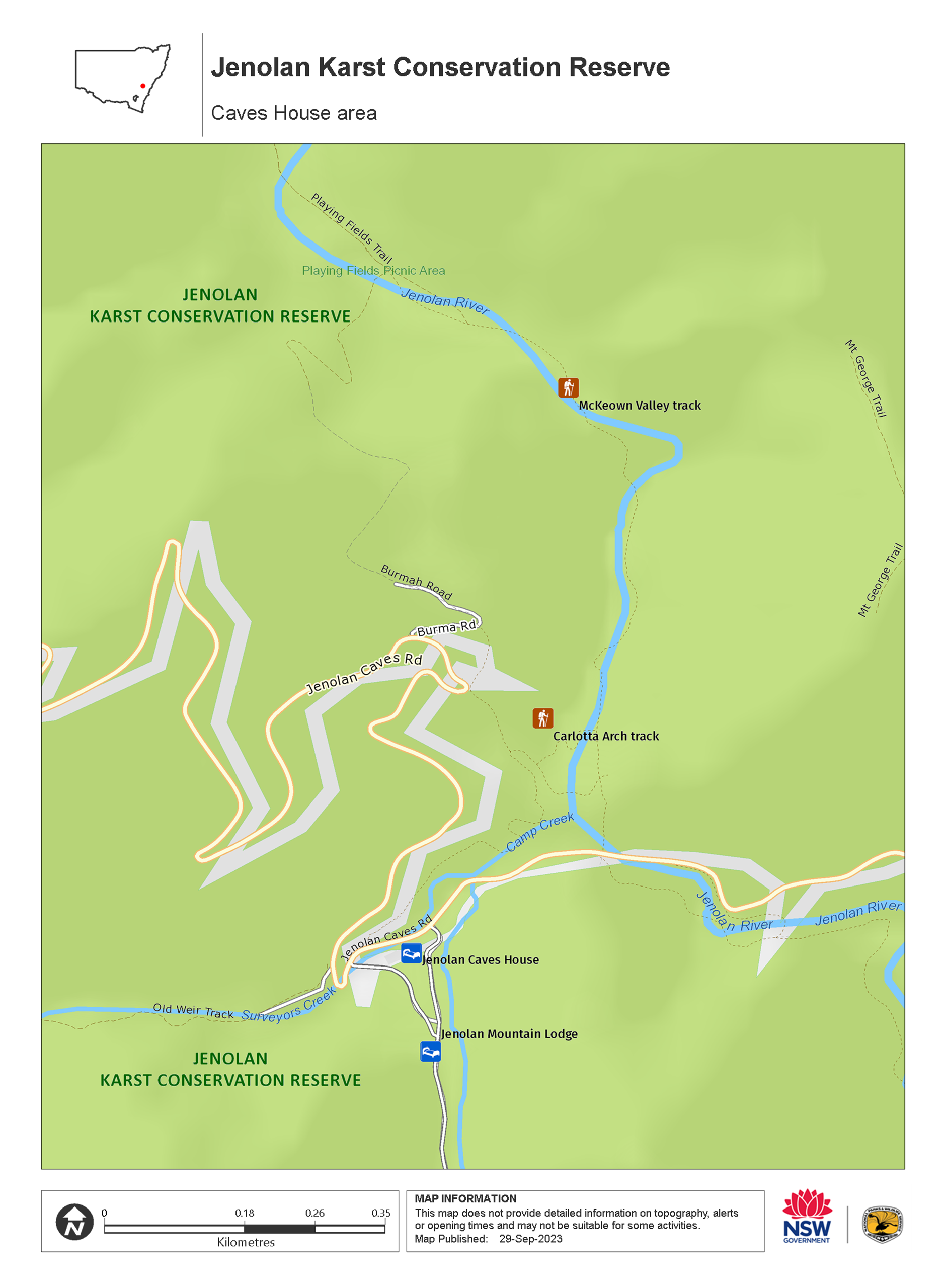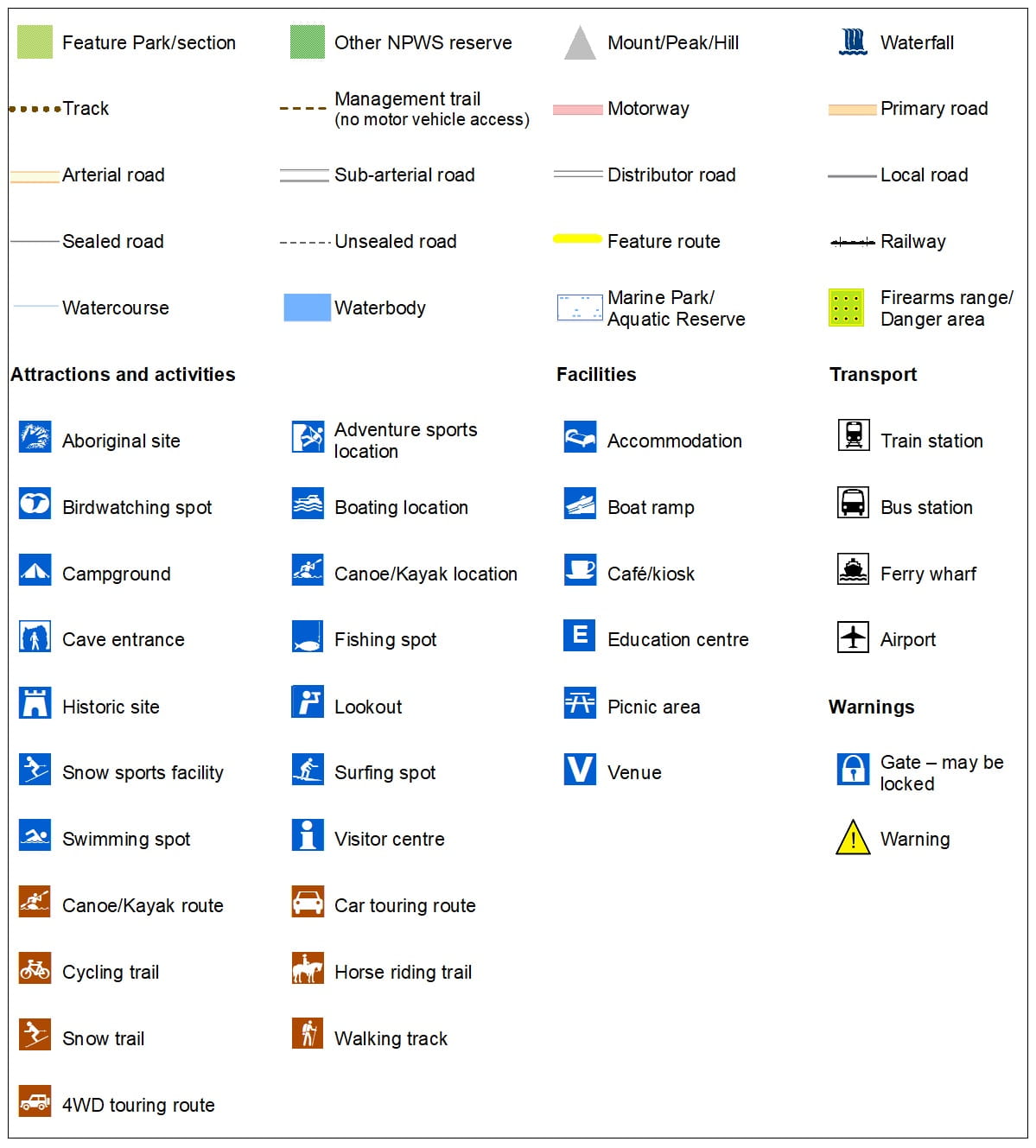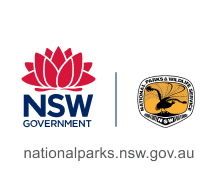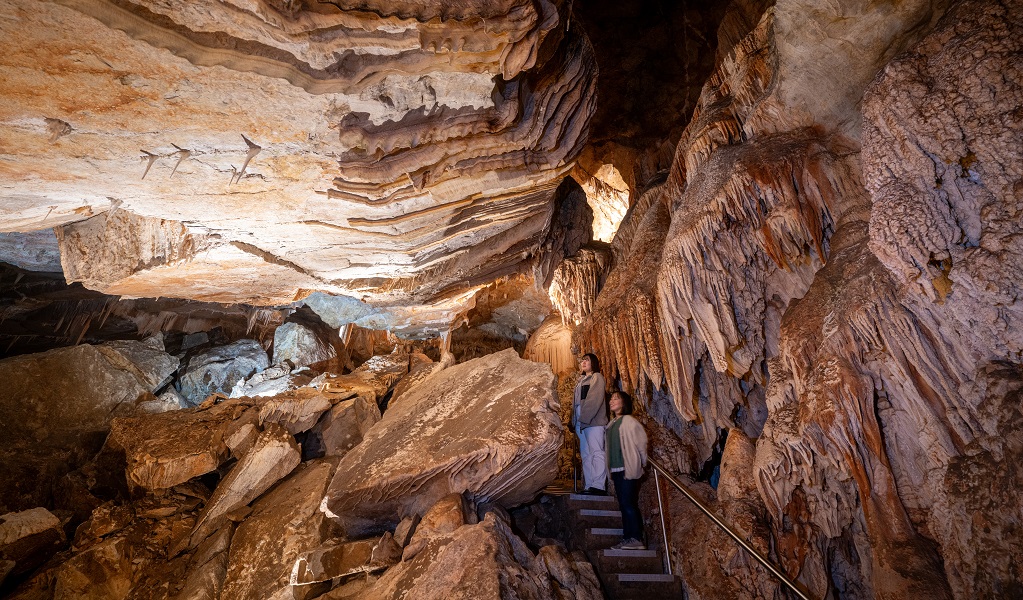Jenolan Karst Conservation Reserve
Overview
Jenolan Karst Conservation Reserve is closed until 2026 while Transport for NSW repairs flood-damaged roads and landslips. During this time, NPWS and Jenolan Caves Trust will also work to upgrade the accommodation, walking tracks and access to caves.
Read more about Jenolan Karst Conservation Reserve
Jenolan Karst Conservation Reserve is closed for road repairs and upgrades until 2026.
Explore the caves at Jenolan Karst Conservation Reserve, near Oberon. It’s a great daytrip from Sydney, or enjoy a weekend away staying in heritage accommodation.
Regarded as Australia's most outstanding cave system, Jenolan Caves is the oldest cave system in the world, and forms part of the Greater Blue Mountains Area World Heritage Property.
The main attraction is the vast network of caves with their amazing limestone formations and pure underground rivers. Book a guided tour to explore the caves. There are also some caves that you can walk through on your own.
Make the most of your visit and stay at the heritage-listed Caves House hotel. You can also book a leisurely lunch or a delicious dinner at Chisholm’s restaurant, or a decadent high tea. Any of these treats can be combined with a guided tour of one of our spectacular caves if you book in advance. For a more casual visit, enjoy the spacious cafe, which offers light lunch, drinks and snacks.
The reserve offers wonderful opportunities for bird watching and wildlife spotting. You might catch a glimpse of a brush-tailed rock wallaby, eastern water dragon, or a platypus. Enjoy the reserve's scenic walking tracks, all leaving from historic Caves House. Take the McKeown Valley walk upstream from Devils Coach House.
Local alerts
For the latest updates on fires, closures and other alerts in this area, see https://www.nationalparks.nsw.gov.au/visit-a-park/parks/jenolan-karst-conservation-reserve/local-alerts
Map

Map

Map legend

Contact
- in the Sydney and surrounds region
This reserve is closed until 2026. For more information, check the Jenolan Caves website.
-
-
Jenolan Caves
1300 76 33 11 or
02 6359 3911 within Australia
+61 2 6359 3911 International
- 4655 Jenolan Caves Road, Jenolan Caves NSW 2790
-
Email: reception@jenolancaves.org.au
-
Jenolan Caves
Visitor info
All the practical information you need to know about Jenolan Karst Conservation Reserve.
Maps and downloads
Nearby towns
Jenolan Caves (1 km)
Scientists from the CSIRO (Commonwealth Science and Industrial Resource Organisation) estimate that the limestone at the Jenolan Caves dates back at least 340 million years.
Oberon (29 km)
If the famous Jenolan Caves are on your travel itinerary Oberon in the Blue Mountains is the perfect spot from which to plan your caving adventure. There are a number of ways visitors can tour the caves.
Lithgow (54 km)
Hassans Walls Lookout, near Lithgow, is the highest in the Blue Mountains. Admire Mt Wilson, Mt York, Mt Tarana and Mt Blaxland as well as the pretty Hartley Valley below. To the south are the Kanimbla and Megalong valley and Mt Bindo. While there, go for a walk or ride around the lookout.
Learn more
Jenolan Karst Conservation Reserve is a special place. Here are just some of the reasons why:
Historic tourism

Jenolan Caves is one of Australia's first tourist attractions; with land having first been set aside for public recreation and enjoyment in 1866. In the years following this, a number of buildings were constructed, the most notable being Caves House; an excellent example of early Victorian architecture and comfortable heritage accommodation. Innovations in engineering and cave lighting are evident - particularly in Chifley Cave. There are more than 300 caves within the Reserve, all containing a range of geological features and formations, like stalactites and stalagmites, plus rarer helictites and stromatolites The best way to find out about the caves is on a guided or self-guided tour. There are eleven caves to choose from.
- Jenolan River walking track Jenolan River walking track and Blue Lake are closed for road repairs and upgrades until 2026.
- McKeown's Valley walking track McKeown's Valley walking track is closed for road repairs and upgrades until 2026.
Greater Blue Mountains Area World Heritage Property

It is truly amazing to think that a city the size of Sydney has a large World Heritage Area on its doorstep. The World Heritage listing recognises the geographic, botanic and cultural values of the area. The forests of the Greater Blue Mountains Area World Heritage Property have been described as a natural laboratory for the evolution of eucalypts; and more than 90 different eucalypt species occur here, some 13 per cent of all eucalypt species in the world. They grow in a great variety of communities, from tall closed forests, through open forests and woodlands, to the stunted mallee shrublands on the plateaus.
Binomil

The beautiful and mysterious Jenolan Caves holds special significance to the Gundungurra people who knew it as 'Binoomea' meaning 'dark places'. According to Gundungurra Elder, Old Jimmy Lynch, Aboriginal people knew the caves, carrying sick people as far as the subterranean water which they believed to have great curative powers. The Dreamtime myth of Gurrangatch relates to the forming of Wombeyan and Jenolan Caves. The caves are said to have been formed during a contest between Gurrangatch, a mythical being that was part fish and part reptile, and Mirragan, a legendary tiger cat.
Plants and animals protected in this park
Animals
-

Eastern bentwing-bat (Miniopterus schreibersii oceanensis)
Eastern bentwing-bats congregate in caves across the east and north-west coasts of Australia, in colonies of up to 150,000. These small Australian animals weigh around 13-17g and can reach speeds of up to 50km per hour. Eastern bentwing-bats use both sight and echolocation to catch small insects mid-air.
-

Platypus (Ornithorhynchus anatinus)
One of the most fascinating and unusual Australian animals, the duck-billed platypus, along with the echidna, are the only known monotremes, or egg-laying mammals, in existence. The platypus is generally found in permanent river systems and lakes in southern and eastern NSW and east and west of the Great Dividing Range.
-

Common brushtail possum (Trichosurus vulpecula)
One of the most widespread of Australian tree-dwelling marsupials, the common brushtail possum is found across most of NSW in woodlands, rainforests and urban areas. With strong claws, a prehensile tail and opposable digits, these native Australian animals are well-adapted for life amongst the trees.
-

Bare-nosed wombat (Vombatus ursinus)
A large, squat marsupial, the Australian bare-nosed wombat is a burrowing mammal found in coastal forests and mountain ranges across NSW and Victoria. The only other remaining species of wombat in NSW, the endangered southern hairy-nosed wombat, was considered extinct until relatively recently.
-

Short-beaked echidna (Tachyglossus aculeatus)
One of only 2 egg-laying mammals in the world, the short-beaked echidna is one of the most widespread of Australian native animals. Covered in spines, or quills, they’re equipped with a keen sense of smell and a tube-like snout which they use to break apart termite mounds in search of ants.
-

Spotted-tailed quoll (Dasyurus maculatus)
The spotted-tailed quoll is the largest remaining carnivorous marsupial on the Australian mainland. It’s protected as a vulnerable species in NSW.
Environments in this park
Education resources (1)
What we're doing
Jenolan Karst Conservation Reserve has management strategies in place to protect and conserve the values of this park. View the detailed park and fire management documents. Here is just some of the work we’re doing to conserve these values:
Understanding landscapes and geology
With a diverse range of geological and landscape value, Jenolan Karst Conservation Reserve keeps the development of infrastructure and maintenance programs as a priority to protect the karst environment while meeting visitor needs.
Preserving biodiversity
The conservation of significant animal and plant species, along with their ecological communities, are a priority of Jenolan Karst Conservation Reserve. As biodiversity is prized in the area, management programs are in place to keep the negative impacts on threatened species and their habitats to a minimum, and to restore them as needed.
Managing weeds, pest animals and other threats
Pests and weeds have a significant impact to the ecosystems within Jenolan Karst Conservation Reserve. Pest reduction of introduced species, such as wild dogs and foxes, as well as risk assessment for new and emerging weeds, is an important part of the work NPWS does to protect the biodiversity integrity of this conservation reserve.
Conserving Aboriginal culture
Jenolan Karst Conservation Reserve has an ongoing consultative relationship with Pejar Local Aboriginal Land Council, the Gundungurra and Wiradjuri Aboriginal People, along with other relevant Aboriginal community organisations and custodial families in the management of their Country, preferred management options for known Aboriginal sites and documenting their cultural heritage value. Park management includes the identifying areas of the reserve requiring further archaeological investigation and determining priorities for investigation in Jenolan.
Managing fire
NSW is one of the most bushfire prone areas in the world as a result of our climate, weather systems, vegetation and the rugged terrain. NPWS is committed to maintaining natural and cultural heritage values and minimising the likelihood and impact of bushfires via a strategic program of fire research, fire planning, hazard reduction, highly trained rapid response firefighting crews and community alerts.

